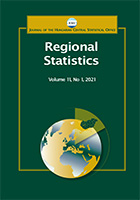The effects of tourism demand on regional sectoral
employment in Turkey
The effects of tourism demand on regional sectoral
employment in Turkey
Author(s): Mustafa Kirca, Mustafa ÖzerSubject(s): Social Sciences, Economy, Geography, Regional studies
Published by: Központi Statisztikai Hivatal
Keywords: tourism demand; sectoral employment; Random Coefficient Regression; panel unit root tests; cross-sectional dependence
Summary/Abstract: This study aims to examine the effects of total, foreign and domestic tourism demand on sectoral employment in regions, based on the level 2 of the Nomenclature of Territorial Units for Statistics (NUTS2) classification determined by the Turkish Statistics Institute (TurkSTAT). For this purpose, we study the impact of tourism demand on overall and sectoral employment in the regions of Turkey between 2004 and 2013, using the Random Coefficients Regression model developed by Swamy. The main results of the study indicate that the contribution of tourism demand, both foreign and domestic to employment, differs across the regions and sectors. Also,the results show that tourism’s employment contribution to the industrial sector is the highest. Moreover, the employment contribution of tourism demand is negative for some regions. The employment contribution of domestic tourists’ stays is greater than that of foreigners. Based on the results of this study, we can conclude that tourism demand can be used as an effective tool to reduce differences in regional developmental level and increase the contribution to both regional and sectoral employment. There is an urgent need to either develop new tourism policies or revise existing ones so that the county and regions can benefit from investing in the tourism sector.
Journal: Regional Statistics
- Issue Year: 11/2021
- Issue No: 01
- Page Range: 78-109
- Page Count: 32
- Language: English

